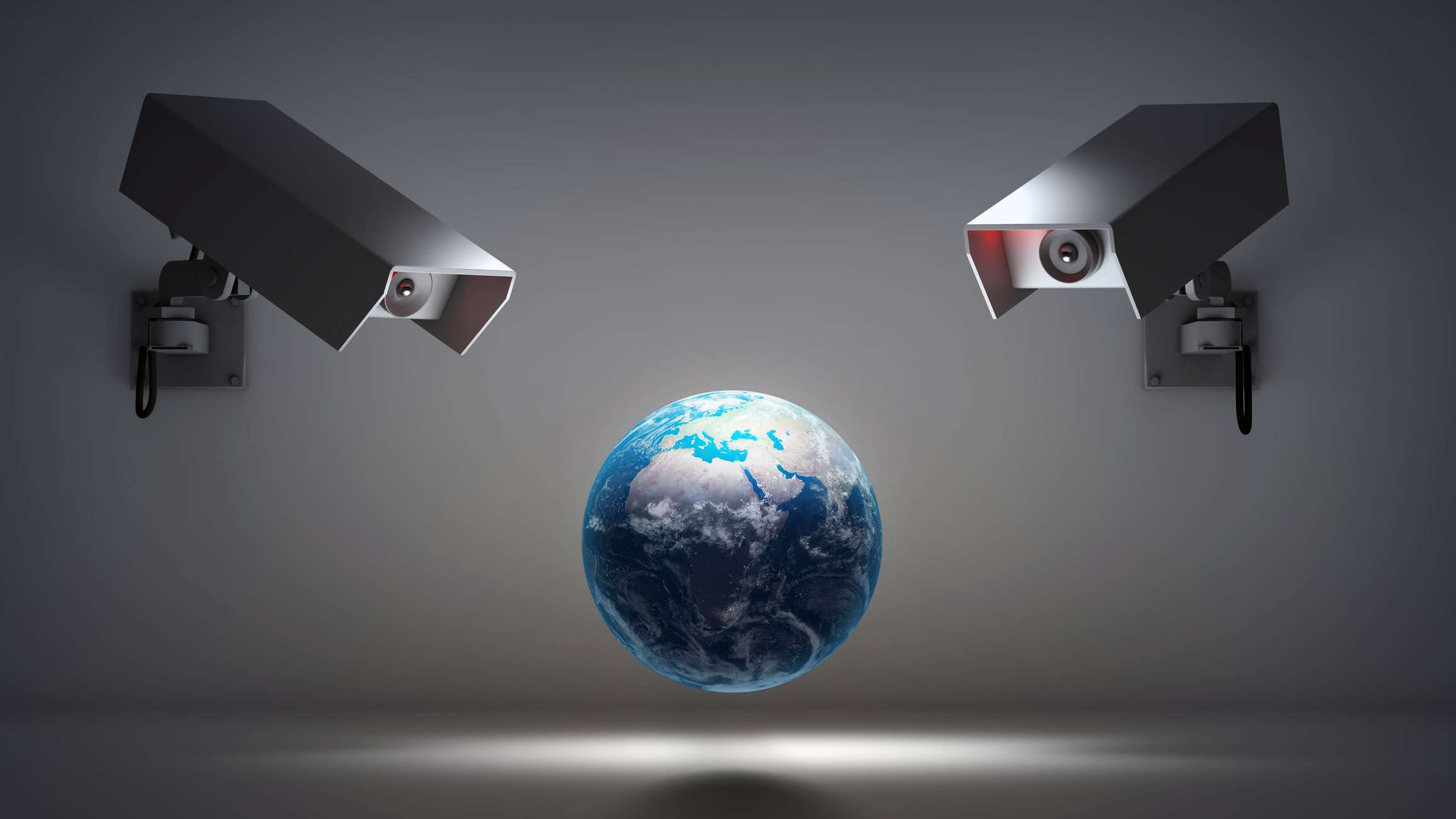The Good, the Bad, and the Unspeakably Ugly: A Reason Surveillance Reform Bill Primer
Congress must make a choice before the end of the year on the level of protections Americans get from unwarranted snooping.


Before the year's end Congress needs to decide what it's going to do about Section 702 of the Foreign Intelligence Surveillance Act (FISA), which permits the federal government to engage in surveillance of foreign targets that are not on U.S. soil, secretly and without warrants.
Section 702 amendments sunset at the end of the year if Congress does not act to renew it. These amendments were originally passed in 2008 and renewed in 2012.
These surveillance authorities have become a source of controversy because it has become increasingly clear to the public that Section 702 has drawn in domestic communications from Americans when they were speaking with (or even just talking about) targets of foreign surveillance.
There are "minimization" procedures to limit the ability of intelligence agencies from reading private communications from and by Americans without a warrant, but civil rights groups and surveillance experts have warned FBI and NSA intelligence agents bend the rules with "back door searches" and "reverse targeting" in order to keep tabs of Americans or people on American soil. Intelligence agencies have also engaged in searches "about" a subject of foreign surveillance, in addition to communications to or from the target, futher drawing in communications of Americans.
The top concerns here are that the surveillance is done without warrants and overseen by the deliberately secret FISA court. The secrecy is to protect intelligence investigations and anti-terror and anti-espionage efforts. Since the intended targets are not supposed to be American citizens and not on American soil, the Fourth Amendment protections against unwarranted searches are not compromised. But when the feds access and use data from Americans, there are problems.
Privacy-minded groups and some supportive lawmakers are looking to reform Section 702 to provide stronger protections for American citizens against unwarranted surveillance. The White House, however, has said they do not want any changes in Section 702, even though President Donald Trump has complained about people in his 2016 presidential campaign having their conversations collected through such surveillance.
Below is a useful primer on the three Section 702 bills floating around in Congress, what each bill hopes to accomplish and a subjective assessment of its chances. It's entirely possible all three fail and a renewal with no changes is added to a must-pass, end-of-year omnibus bill. It's also possible Congress will fail to get a renewal approved and Section 702 sunsets. The Electronic Frontier Foundation, among other groups, would love to see Section 702 surveillance authorities go away entirely. But there is little evidence lawmakers are willing to take that political risk at a time of public concern over mass violence or terrorist attack within the U.S. borders.
USA Liberty Act of 2017 (H.R. 3989)
This is an intended "compromise" bill that has been offered up to rein in the use of unwarranted use of Americans' communications to fight domestic crimes while still allowing some access intended to assist the FBI and NSA in fighting terrorism and espionage from foreign actors.
What does it actually do about surveillance? The USA Liberty Act requires federal investigators to get a court order in order to access the content of domestic communications when looking for evidence of a crime. The information accessed must be directly related to an investigation. The bill provides exceptions for getting foreign intelligence information (which is the point of the surveillance authorization in the first place), if the subject qualifies under federal law for an emergency surveillance authorization, or if the target's life is directly threatened and the information may be used to assist them. The bill creates specific procedures to document requests for the "unmasking" of the identity of an American who is referenced in these collected communications.
Is it any good? The USA Liberty Act doesn't actually stop a lot of "back door" access to unwarranted domestic surveillance. The restriction on accessing data doesn't do anything about the collecting or storing of communications. It is also worrisome that the exception for "foreign intelligence" information is much broader than people realize. This exception could be used to snoop on immigrants or anybody with any foreign ties. American citizens would essentially lose their protection from warrantless snooping on communications involving foreigners or issues connected to other countries.
Elizabeth Goitein of the Liberty and National Security Program at the Brennan Center for Justice at NYU School of Law is worried the USA Liberty Act is actually a step backward from the current interpretations of Section 702's limits and sets a dangerous precedent:
A rule that discounts Americans' rights in the foreign intelligence context would set an ominous precedent for future legislative and administrative action. If no judicial review is required for the FBI to read Americans' emails when it seeks foreign intelligence, perhaps the Patriot Act's requirement that the FISA court approve the seizure of Americans' business records could be dispensed with, as well. If there is a foreign intelligence exception for searches of Section 702 data, why not a similar exception to the rules established by the Privacy Act for handling personal information about Americans collected by government agencies? One by one, we could see this gaping loophole start to insert itself in the body of laws and policies that has been established over the past four decades to protect Americans' privacy.
Privacy-minded lawmakers attempted to add an amendment to end "back door" searches but it failed. Leaders of the House Judiciary Committee (responsible for hammering out this bill) said a bill ending "back door" searches entirely would not fly with top lawmakers.
What are its chances? A compromise bill with bipartisan sponsorship (seven Republicans, six Democrats) improves its chances of being considered seriously. It was approved out the House Judiciary Committee. It probably has a better chance than other reform bills. In fact, late last week, Sens. Patrick Leahy (D-Vt.) and Mike Lee (R-Utah) introduced the Senate version of this bill, which is a bit different from this House bill. It provides stronger requirements for federal intelligence officials to get an order from the FISA Court in order to access and domestic communications. Goitein has a much more positive view of Leahy's version of the bill. The differences between the House and Senate bill would need to be hammered out.
USA RIGHTS Act of 2017 (S. 1997)
The bill's full name is the Uniting and Strengthening America by Reforming and Improving the Government's High-Tech Surveillance Act of 2017. It's the result of a long-standing bipartisan pairing of Sens. Ron Wyden (D-Ore.) and Rand Paul (R-Ky.) fighting for strong Fourth Amendment privacy protections against unwarranted data collection and surveillance. Several other familiar names in the Senate—Mike Lee, Elizabeth Warren, Bernie Sanders, among them—have signed onto this legislation.
What does it actually do about surveillance? The USA RIGHTS Act explicitly orders the feds to get a warrant to search information or communications collected or about U.S. citizens or people on U.S. soil. Unlike the USA Liberty Act, it doesn't confine the restriction to criminal investigations, making it harder for federal investigators to bypass. It has exceptions, but they're limited to investigations of terrorism, espionage, and threats to the United States.
In addition, the act would prohibit "reverse targeting"—engaging in surveillance of foreign targets to snoop on the people communicating with them without a warrant. It would also ban "about" searches. This act helps U.S. citizens establish official standing to take the matter to the courts if they believe they've been snooped on illegally.
Is it any good? This bill provides Americans the strongest protections from unwarranted federal surveillance, absent the expiration of Section 702. As such, the act has the support of a host of civil rights and privacy rights groups across the political spectrum, from the American Civil Liberties Union, to the National Association for the Advancement of Colored People, to the Campaign for Liberty, to FreedomWorks.
What are its chances? Despite a broad ideological base of support, neither the White House nor ranking leadership in Congress has shown interest in restraining secret surveillance by the FBI or NSA. Even though Trump quite loudly and publicly claimed that the intelligence community broke the rules by snooping on people during his campaign, his formal position is to see Section 702 unchanged and reauthorized. Rand Paul's golf-buddy relationship with Trump notwithstanding, this bill faces an uphill battle with little time to win leaders over.
FISA Amendments Reauthorization Act of 2017 (S.2010)
Don't be fooled by the name of this bill, pushed by Senate Intelligence Committee Chairman Richard Burr (R-N.C.). Yes, it reauthorizes the FISA amendments for eight more years. But this reauthorization bill significantly changes and expands federal surveillance authorities.
What does it actually do about surveillance? This act ends controversies about the limits of federal domestic snooping by openly authorizing the use of unwarranted FISA surveillance against American targets in a many situations.
This act explicitly grants the FBI and NSA use of information collected from unwarranted surveillance of American citizens in a list of federal crimes far beyond terrorism and espionage. This includes any criminal actions that lead to death, bodily injury, or kidnapping, crimes against minors, cybersecurity violations, transnational drug and organized crime, and transnational human trafficking.
The bill also will allow the FBI and NSA to restart and engage in "about" searches—unwarranted access to communications "about" a target of surveillance, not just to and from that target—unless Congress acts within 30 days to pass legislation stopping them.
Is it any good? This is a very, very bad bill. This act turns authorizations meant to secretly keep track of foreign espionage and terrorists onto its own citizens, in clear defiance of the intent of the Fourth Amendment to the Constitution.
Government officials are supposed to be able to get warrants to get access to private information and communications of American citizens. Not only does this bill purposefully establish a domestic surveillance system that ignores the Fourth Amendment, it declares the attorney general's decision to deploy Section 702 surveillance tools for a domestic criminal case "is not subject to judicial review." The bill itself attempts to keep the courts from ruling on whether the use of domestic communications collected without a warrant is constitutional.
What are its chances? It is difficult to imagine this legislation passing in anything like its current form, even with the Senate Intelligence Committee's stamp of approval. There is significant bipartisan opposition in the House against simple reauthorization of Section 702, let alone codifying permission to use secret surveillance to prosecute domestic crimes. This bill feels more like a stick to force lawmakers to find compromise most lawmakers can support. But keep an eye out for any of the worst components of this bill being amended to a compromise, or worse, this innocuously named act quietly finding its way into must-pass, end-of-year omnibus legislation.


Show Comments (6)